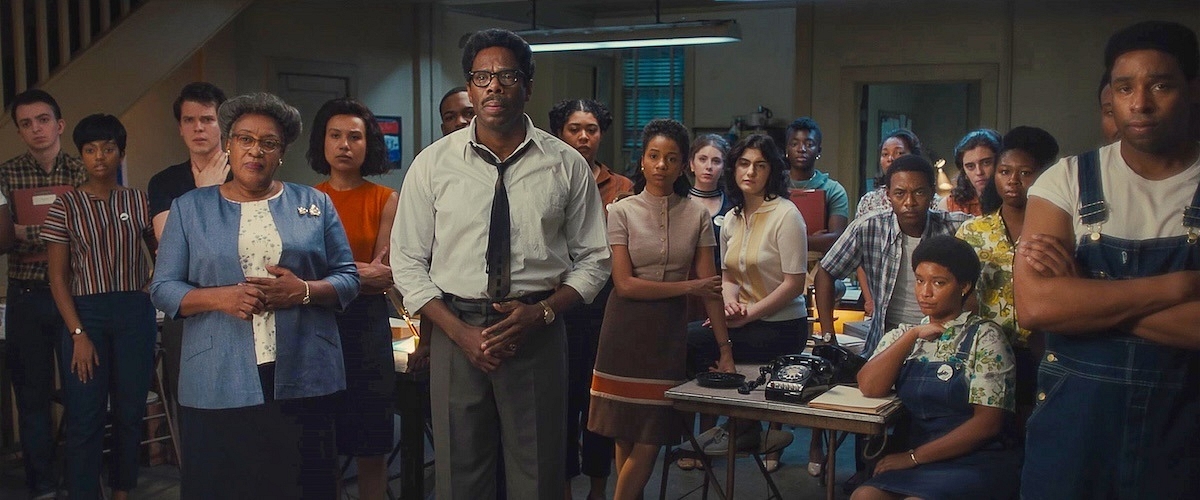
A scene from the new movie "Rustin."
At a time when civil rights are being challenged and some of the 60-year-old battles are being waged again, last Saturday night, Yale Schwarzman Center (YSC) presented an early screening of “Rustin,” a film about an often-forgotten civil rights leader.
Bayard Rustin, an activist who dedicated his life to the tireless quest for Black and LGBTQ rights, for gender equality and democracy, was the architect of the March on Washington, leading an uneasy coalition to this event that has come to define the pinnacle of the Civil Rights Movement. But as an openly gay Black man in the 1960s, Rustin was all but erased from the historical understanding of the movement he helped build.
“Rustin,” a film that documents his life, shines a renewed light on the personal, interpersonal, and public struggles among leaders of the movement leading up to the March on Washington. It premieres in select theaters Nov. 3, and on Netflix Nov. 17.
“Bayard Rustin made history, he changed history, and history repaid him by forgetting him,” remarked Rustin producer, Academy Award winner, and Yale alum Bruce Cohen.
“We are in this time where the forces of darkness and regression are pushing towards us in all areas,” Cohen said during a post-screening discussion. “And if we don’t form the coalition that Bayard put back together and all believe it’s the larger version — what he says, ‘On the day I was born Black, I was also born a homosexual, they either believe in truth and justice for all or they do not.’”
He continued: “So that part, it’s not just Black and homosexual. It’s all of us together. It’s every underrepresented community. If we do not see each other’s rights, then we’re the aggressor.”
The film features a Hollywood heavy-weight cast anchored by Emmy Award winner Colman Domingo as Rustin, with Chris Rock, Glynn Turman, Aml Ameen, and Gus Halper. The credentials for those off camera are just as impressive. In addition to Cohen, “Rustin” is directed by Higher Ground’s DGA Award and five-time Tony Award winner, George C. Wolfe and Tonia Davis, with executive producers Michelle and Barack Obama.
Joining Cohen in conversation after the screening of the film was “Rustin” costume designer and co-chair of design at the David Geffen School of Drama Toni-Leslie James, and Yale African American Studies and American Studies professor Crystal Feimster.
As a producer, Cohen shared how the production team worked to make “Rustin” as historically accurate as possible. The Obamas held the making of the film to a high bar, so the team worked with historians to make it as accurate to the events that occurred as possible.
James shared her experience working on “Rustin,” where a lot of research was required to maintain historical accuracy down to some of the seemingly simple outfits that were worn.
“Every project we do, we have an incredible amount of research … We went back and looked at historical photographs of named characters within the script and also the [March on Washington] – hundreds of photographs of the march, organizations that participated in the march. And then just after you get all of this specific research done, then you go and find a shirt that’s like ‘1963’” she added.
Ultimately, the story of Rustin is one that serves as a reminder that historically, Black and gay voices are often suppressed.
“I think for many of us in this room it’s a very blatant, loud example that we have to tell our stories, and no one is going to tell our stories for us. The Black stories, gay stories are not going to get told if we don’t do it,” Cohen said.
Producer Bruce Cohen was a guest on LoveBabz LoveTALK, Oct. 26.

Bruce Cohen and Babz Rawls-Ivy on a recent episode of "LoveBabz LoveTalk."


“He continued: “So that part, it’s not just Black and homosexual. It’s all of us together. It’s every underrepresented community. If we do not see each other’s rights, then we’re the aggressor.”
-Bayard Rustin
Divided we are weak, together we are strong.
We have to stand up together to fight against discrimination and hate against all marginalized groups, because if they come for one of us, they will come for all of us, eventually.